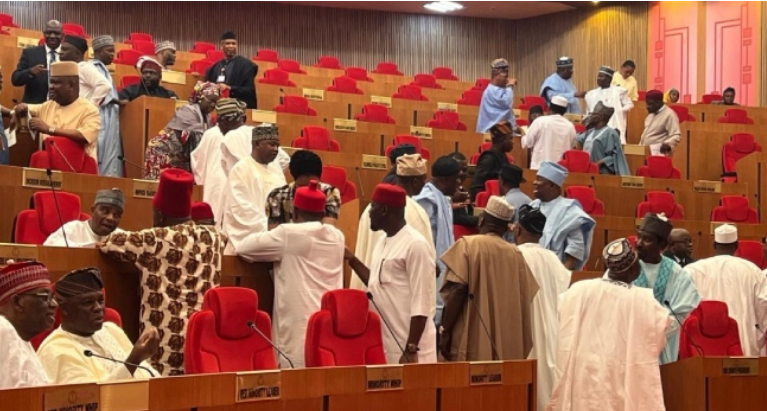The Imperative for a National Rice Development Council in Nigeria: A Deep Dive into the Proposed Legislation
Nigeria’s agricultural landscape is dominated by rice cultivation, a staple crop deeply ingrained in the nation’s dietary habits. Recognizing the strategic importance of rice in food security and economic growth, the Nigerian Senate is actively pursuing the establishment of a National Rice Development Council. This dedicated body aims to harmonize and optimize the entire rice value chain, from research and development to marketing and consumption. The proposed council is envisioned as a coordinating hub, bringing together various stakeholders, including farmers, processors, millers, researchers, and marketers, to address the challenges and unlock the full potential of the rice sub-sector.
The journey towards establishing the National Rice Development Council began in the 9th Senate, where a similar bill was passed but failed to secure presidential assent. Undeterred, the 10th Senate has revived the initiative, demonstrating a strong commitment to strengthening the rice industry. Senator Adamu Aliero, the bill’s sponsor, champions the council as a vital platform for comprehensive rice sector development and stakeholder organization. He emphasizes the need for a central coordinating body to streamline the efforts of numerous rice-related associations currently operating with varying and sometimes conflicting policies. This fragmented approach hinders the efficient and sustainable growth of the rice industry, necessitating a unified strategy under the proposed council’s umbrella.
The current landscape features a multitude of rice-focused associations, including the Paddy Rice Dealers Association of Nigeria, the Rice Farmers Association of Nigeria, the Rice Processors Association of Nigeria, the Rice Millers of Nigeria, the Women Farmers Advancement Network, Ofada Rice Producers, the Abakaliki Rice Producers Association, and the Women in Rice Platform. These groups, while individually contributing to the sector, lack a central coordinating mechanism. The proposed National Rice Development Council will serve as this unifying force, providing a cohesive framework for policy formulation, research dissemination, and market development. This centralized approach will ensure that all stakeholders are aligned towards common goals, maximizing the efficiency and impact of their efforts.
The potential benefits of the National Rice Development Council are multifaceted and far-reaching. At the core of its mandate is the enhancement of rice production through coordinated research, development, training, and the dissemination of best practices. These initiatives are expected to significantly boost rice yields and quality, contributing to increased national output. Furthermore, the council aims to empower rice farmers by improving production efficiency, reducing costs, and enhancing market access, ultimately leading to higher incomes. This economic empowerment of farmers is crucial for fostering sustainable agricultural practices and reducing rural poverty. The council’s focus on a stable rice supply chain will also reinforce national food security, ensuring consistent access to this essential staple for the Nigerian population.
Beyond production and farmer welfare, the National Rice Development Council is envisioned to play a broader role in industry regulation, market development, job creation, and overall economic growth. By establishing clear standards and regulations, the council will promote transparency and fair competition within the rice industry. Its efforts in market development will explore new domestic and international markets for Nigerian rice, contributing to economic diversification and export revenue generation. The revitalized rice sector, fueled by the council’s initiatives, is also expected to create numerous employment opportunities along the value chain, from farming and processing to marketing and logistics. This job creation will contribute to poverty reduction and economic upliftment in rural communities.
The overarching goal of the National Rice Development Council is to propel Nigeria towards self-sufficiency in rice production and establish the nation as a major player in the global rice market. Senator Aliero underscores the strategic importance of rice in the national diet and its potential to drive economic growth. By nurturing a robust and sustainable rice industry, Nigeria can not only secure its domestic food needs but also generate valuable export revenue and strengthen its position in the global agricultural landscape. The Senate’s commitment to this initiative, reflected in the bill’s reintroduction and referral to the Senate Committee on Agriculture, highlights the recognized importance of the National Rice Development Council in transforming the Nigerian rice sector and contributing to the nation’s overall economic development. The council’s success will hinge on effective collaboration between government agencies, research institutions, private sector actors, and, most importantly, the rice farmers themselves.
The comprehensive approach of the proposed council addresses the multifaceted nature of the rice industry. It delves into research and development, production enhancement, farmer empowerment, market regulation, and economic growth. The establishment of this body signifies a decisive step towards unlocking the immense potential of the Nigerian rice sector and ensuring food security, economic prosperity, and global competitiveness. The upcoming deliberations within the Senate Committee on Agriculture will be critical in shaping the final form of the bill and determining the ultimate effectiveness of the National Rice Development Council in achieving its ambitious goals. The potential impact of this legislation extends beyond the rice industry itself, holding promise for broader agricultural development and economic transformation in Nigeria.














